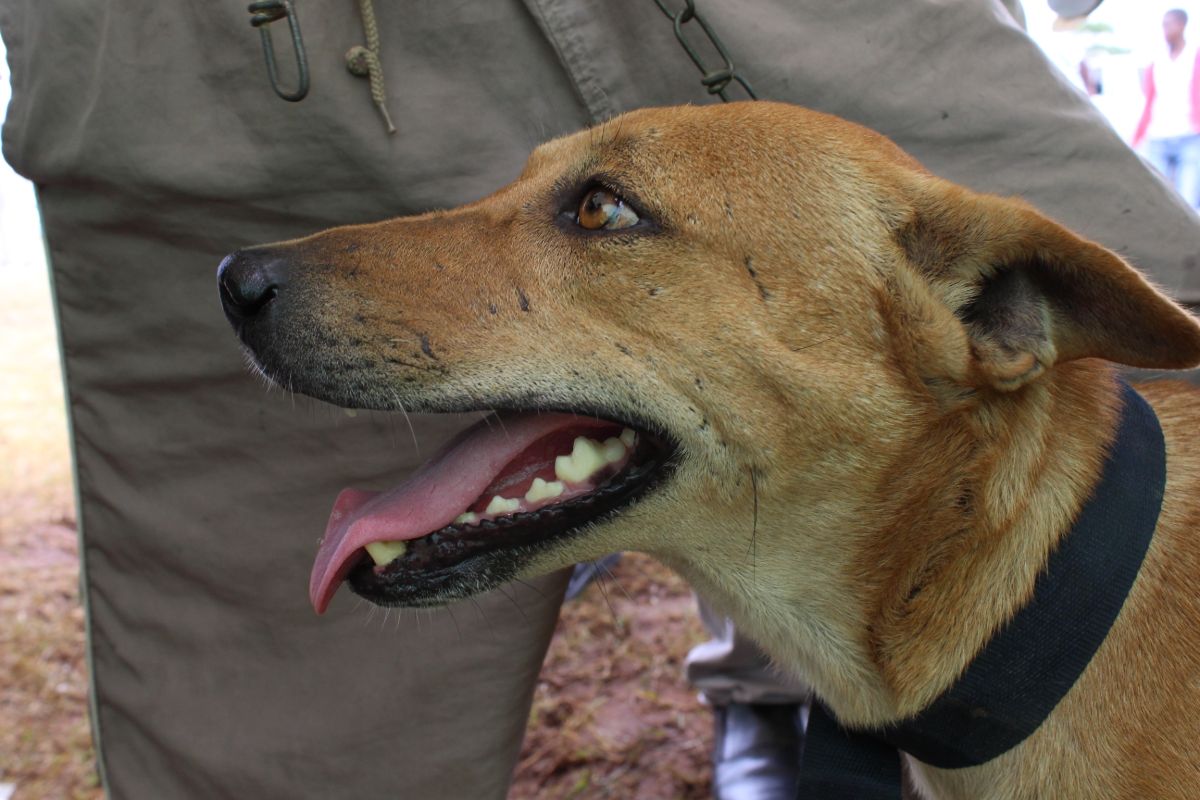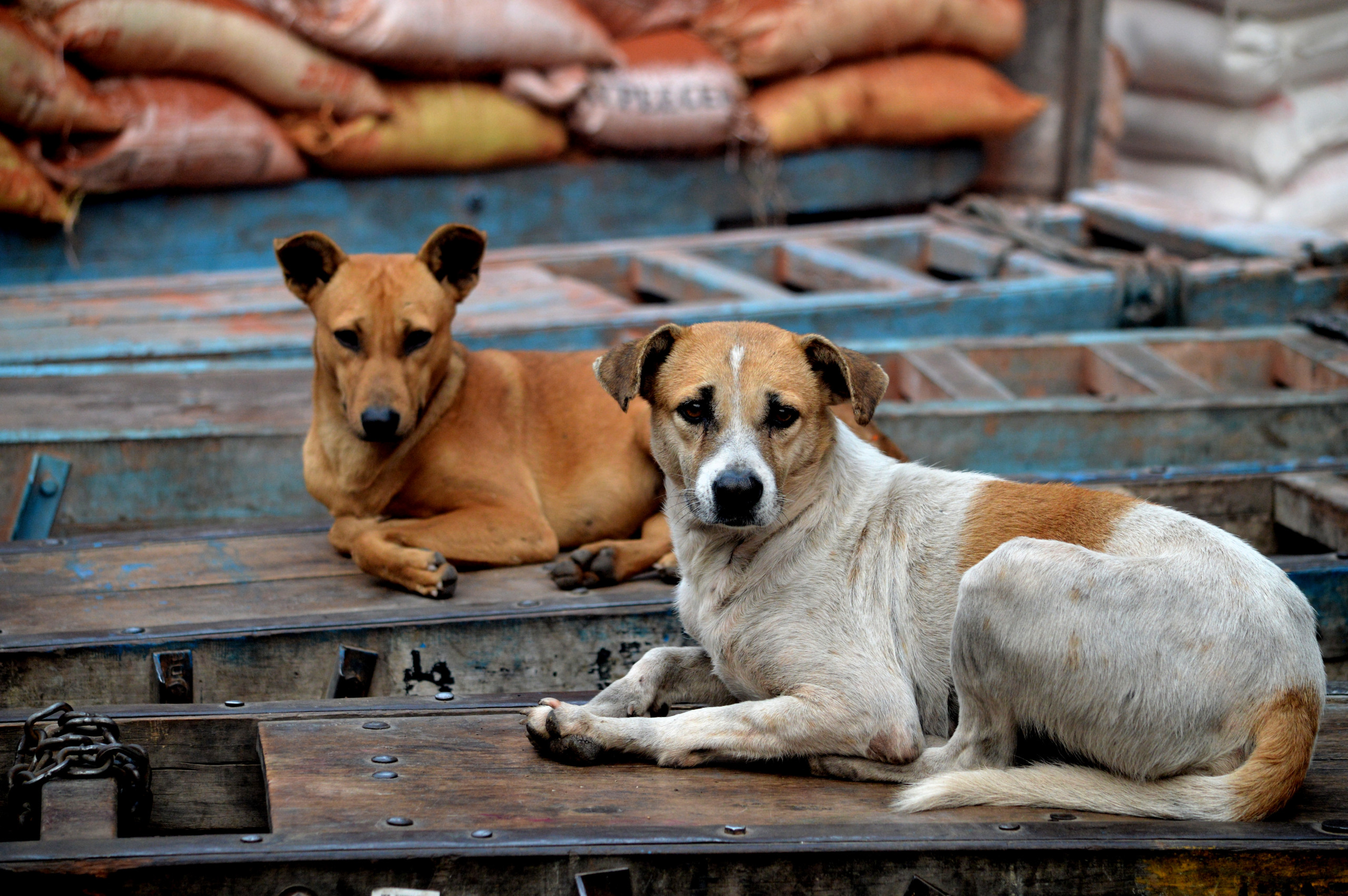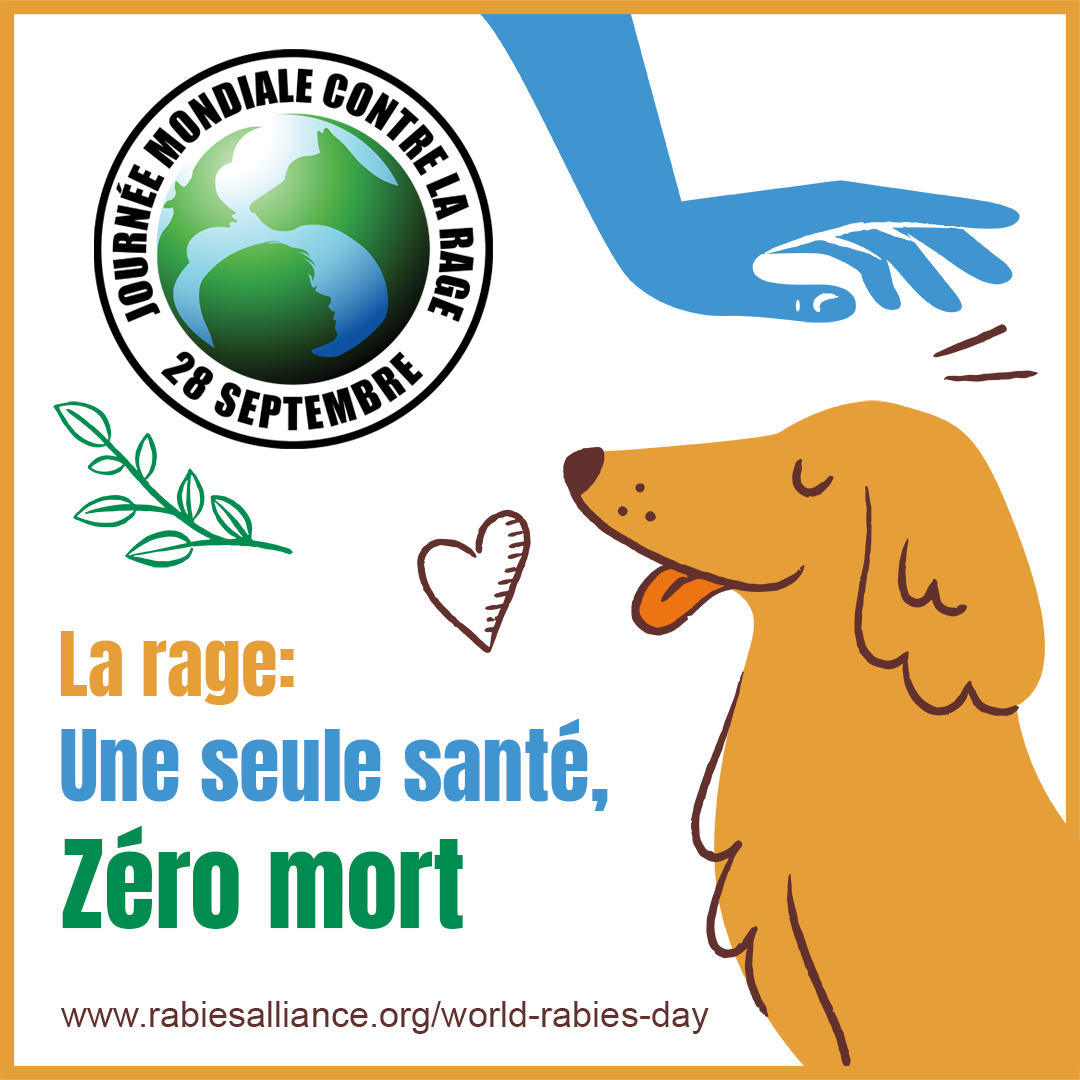
La 16e Journée mondiale de la rage (JMR) a été commémorée le 28 septembre 2022. Le thème de cette année était “La rage : Une seule santé, zéro décès”.
Conformément au thème de cette année, et dans l’esprit de “One Health”, les organisations quadripartites (FAO, OMS, OMSA et PNUE), ainsi que l’Alliance mondiale pour la lutte contre la rage (GARC) et l’Union africaine, ont conjointement invité à participer au webinaire régional.
La rage est une maladie zoonotique hautement mortelle, mais évitable par la vaccination, qui est endémique dans la plupart des pays africains. Chez l’homme, la rage est presque entièrement (99%) causée par des morsures de chiens enragés. Si la rage transmise par les chiens a été éliminée en Europe occidentale, en Amérique du Nord, au Japon, en Corée du Sud et dans certaines régions d’Amérique latine, le fardeau de la rage reste élevé dans les populations rurales pauvres d’Afrique et d’Asie.
Les efforts mondiaux visent actuellement à éliminer les décès humains dus à la rage transmise par les chiens d’ici 2030.
Cependant, la menace de la rage devrait augmenter en Afrique, en l’absence d’efforts soutenus pour combler les lacunes dans l’accès à la vaccination préventive des chiens et à la prophylaxie post-exposition pour les personnes et les animaux touchés.
Le webinaire de cette année a fait le point sur les efforts nationaux en matière de programmes antirabiques dans les pays africains. Il avait également pour objectif de plaider en faveur de l’adoption de l’approche “Une seule santé” dans la mise en œuvre du “Zéro d’ici 30 : le plan stratégique mondial pour éliminer les décès dus à la rage humaine provoquée par les chiens d’ici 2030” sur le continent africain.
Les objectifs généraux du webinaire étaient les suivants
Les discussions ont mis en évidence les progrès réalisés au niveau national dans la lutte contre la rage. La session a fourni une plateforme pour l’échange d’expériences, de défis et de leçons apprises, dans la mise en œuvre de l’approche multisectorielle One Health pour les programmes de lutte contre la rage.
Cet objectif visait à sensibiliser les pays africains aux outils et ressources techniques pour la formulation, le suivi et l’évaluation de l’impact de la feuille de route sur la rage.
L’importance de l’approche “One Health” dans les programmes de lutte contre la rage en Afrique a été discutée. La participation de l’auditoire a permis d’identifier les lacunes dans lesquelles la collaboration multisectorielle doit être renforcée pour atteindre progressivement l’objectif de zéro décès humain dû à la rage.
| Heure | Activité | Presentateur | Moderateur |
| Session 1: Ouverture officielle | |||
| 10:00 – 10:10 | Mots de bienvenue et d’ouverture | Union Africaine Dr Nick Nwankpa
(BIRA et PANVAC) |
Dr Yewande Alimi
(Union Africaine) |
|
10:10 – 10:40 |
Mots d’ouverture |
Prof. Louis Nel (Alliance mondiale contre la rage: GARC)
Dr Mohammed Shamsuddin (représentant le Représentant Régional pour l’Afrique) Dr Richard Munang (PNUE représentant Afrique) Dr Baba Ebenezer Sheshi (OMS) Dr Karim Tounkara (Représentant OMSA Afrique) |
|
| Session 2: Une seule santé et lutte contre la rage en Afrique – Présentations des pays | |||
| Heure | Activité | Présentateur | Modérateur |
| 10:40 – 10:55 | Cadre ipolitique et institutional | Panorama des politiques des arrangements institutionnels pour l’élimination de la rage en Afrique en 2030
Dr Kavosa Mudoga (Action pour la Protection des Animaux Afrique)
Etat de preparation des pays pour l’élimination de la rage en 2030 Dr. Judy Kimaru (Action pour la Protection des Animaux Afrique) |
Africa CDC |
| 10:55 – 11:10 |
Expériences, défis et leçons apprises de la mise |
Dr Nehemia Hedimbi (Namibie) | |
| 11:10 – 11:25 | Dr Kallo Vessaly (Côte d’Ivoire) | ||
| 11:25 – 11:40 | en œuvre de l’approche ‘’Une Sseule santé dans les programmes de lutte contre la rage | Dr Daoudongar Magloire (Tchad) | |
| 11:40 – 11:55 | Dr Ilham Ahamjik (Maroc) | ||
| 11:55 – 12:10 | Dr Justine Kanda Assenga (Tanzanie) | ||
| 12:10 – 12:25 | Questions-Reponses | ||
| 12:25 – 12:30 | Sondage Mentimeter: Principaux succès et contraintes dans la mise en œuvre des programmes Une Seule Santé contre la rage dans votre pays? | ||
| 12:30 – 12:40 | Réflexions sur le résultat du sondage (5 mins) | Dr Charles Bebay (FAO) | |
| Session 3: Outils et ressources pour accompagner l’approche ‘’Une seule santé’’ dans la mise en œuvre des programmes d’élimination de décès humains liés à la rage transmise par les chiens | |||
| Heure | Activité | Presentateur | Moderateur |
| 12:40 – 12:55 | Aperçu général des outils et ressources sur la rage | Dr Rachel Tidman (OMSA) | AU-IBAR |
| 12:55 – 13:10 | Feuille de route du forum ‘’Tous Unis Contre la Rage’’ et son rôle dans la compilation des différents outils et ressources |
Dr. Andre Coetzer (GARC) |
|
| 13:10 – 13:25 | Renforcement de la prévention et de la prise en charge post exposition | Dr. Tieble Traore (OMS) | |
| 13:25 – 13:40 | Vaccins antirabiques testés en Afrique
Ethel Chitsungo (UA-PANVAC) |
||
| 13:40 – 13:55 | Réseau des laboratoires de référence/jumelage de laboratoires pour le | ||
| 13:55 – 14:10 | Diagnostic de laboratoire de la rage | diagnostic de la rage de l’OMSA
Dr. Claude Sabeta (OVI)
Performance des laboratoires de santé animale dans le diagnostic de la rage dans certains pays d’Afrique Mr. Joshua Kimutai (FAO) |
|
| 14:10 – 14:25 | Questions-Reponses | ||
| 14:25 – 14:40 | Mot de cloture | PNUE |
| Name | Speaker Profiles |
| Dr Kavosa Mudoga
(AU IBAR consultant) |
Dr Kavosa Mudoga is the director Action for Protection of Animals Africa, in Nairobi, Kenya where she/he is involved in Animal Welfare. More specifically, on rabies, her speciality is in Dog population Management implemented in Several countries in Africa.During the Africa Rabies Webinar on 27 th September 2022, Kavosa Mudoga will be speaking on the topic: The Landscape of Policies and institutional arrangements for Rabies Elimination in Africa by 2030.
|
| Dr. Judy Kimaru (AU-IBAR consultant) | Dr. Kimaru is a disaster risk reduction specialist, and a veterinarian has over 25 years of experience working in the UN (UNOCHA, FAO, WFP, UNDP) and NGO, and her specialty is disaster risk management, food security, and animal welfare. She has worked in Africa and Asia on programs ranging from food security and policy to ground programs.
She is a Director with Action for Protection of Animals Africa (APAA). She is currently completing her Ph.D. in Environmental Governance and Management with the University of Nairobi, adding to her expertise in environmental management for livestock food systems and her Master’s in Business Administration degree. During the Africa Rabies Webinar on 27 th September 2022, Kavosa Mudoga will be speaking on the topic: Institutional preparedness of African countries to eliminate Rabies by 2030.
|
| Dr Nehemiah Hedimbi (Namibia) | Dr. Nehemia Hedimbi is the Veterinarian in the Directorate of veterinary Services, Ministry of Agriculture, Water and Land Reform, Opuwo Town, Kunene Region of Namibia. I am the National Rabies Control Programme Coordinator.
During the Africa Rabies Webinar on 27th September 2022, Nehemia Hedimbi will be speaking on the topic: Experiences, challenges and lessons learnt in implementation of One Health approach in Rabies programmes in Namibia.
|
| Dr Vessaly Kallo
(Côte d’Ivoire) |
Dr. Vessaly Kallo, is a veterinarian specialized in veterinary public health, epidemiology, and the implementation of the One Health approach. He has about 20 years of professional experience in the national public administration, specifically in the Veterinary Services where he has participated and coordinated the fight against zoonoses and animal epidemics (Rabies, HPAI, Swine fever, viral hemorrhagic fevers).
Professionally, he has served as the Director of Veterinary Services of Côte d’Ivoire since August 2021. He is also the Permanent Delegate of Côte d’Ivoire to the World Organization for Animal Health (WOAH). He is the Chairman of the Animal Health Working Group of the One Health Platform in Côte d’Ivoire and the ECOWAS Expert Group for the control of Foot and Mouth Disease. Dr. Kallo, was the national coordinator of the research project on the burden of rabies in Côte d’Ivoire between 2016 and 2018. He has shared his expertise as a consultant in the field of veterinary public health for several national and international institutions such as FIRCA, FAO, WHO, EU EDES program, EcoAlliance, and USAID. He has to his credit several scientific and professional articles including two scientific articles on rabies in Côte d’Ivoire. He has also published on brucellosis, evaluation of drug residues in animal products, and biosecurity. During the Africa Rabies Webinar on 27th September 2022, Dr Vessaly Kallo will be speaking on the topic: Experiences, challenges and lessons learnt in implementation of One Health approach in Rabies programmes in Côte d’Ivoire. |
| Dr Daoudongar Magloire
(Chad) |
Dr Daoudongar Magloire is the Head of the division of regulations, legislation and sanitary control of animal movements in Chad. He has contributed to One Heath platform workshops on Development of the Good Governance Manual; Planning on the guide for the integration of health security in sectoral policies ; Food safety; National Health Security Plan and Training in field epidemiology within the framework of One Health.
During the Africa Rabies Webinar on 27th September 2022, Dr Daoudongar Magloire will be speaking on the topic: Experiences, challenges and lessons learnt in implementation of One Health approach in Rabies programmes in Chad. |
| Dr Ilham Ahamjik
(Morocco) |
Dr Ilham Ahamjik is the Head of The Epidemiology and Health Surveillance Service in The National Office of Food Safety (ONSSA), Rabat, Morocco where she is involved in developing, implementing and evaluating animal diseases surveillance and control programs. More specifically, on rabies, she coordinates the epidemiological surveillance program and participates in the development of rabies control strategy in Morocco. She is WOAH national focal point for animal disease notification.
During the Africa Rabies Webinar on 27th September 2022, Dr Ilham AHAMJIK will be speaking on the topic: Experiences, challenges and lessons learnt in implementation of One Health approach in Rabies programmes in Morocco. |
| Dr Justine Assenga
(Tanzania) |
Dr Justine Assenga has been involved in coordination of a number of rabies preparedness and response activities as a prioritization of zoonotic diseases; multisectoral response to rabies outbreak in Moshi, Malinyi and Ulanga; and rabies After Action review. He has been deeply involved in development of national rabies control strategy, and in the development of Surveillance guidelines for priority zoonotic diseases including rabies. Dr Assenga has also participated in joint risk assessment focusing on rabies and well as facilitating training of rapid response teams in Tanzania for rabies.
During the Africa Rabies Webinar on 27th September 2022, Dr. Justine A. Assenga will be speaking on the topic: Experiences, challenges and lessons learnt in implementation of One Health Approach in Rabies elimination in Tanzania |
| Dr Rachel Tidman
(WOAH)
|
Dr Rachel Tidman is the Global Rabies Coordinator, based with the World Organisation for Animal Health. Her key role is coordinating the United Against Rabies Forum, an inclusive global network of rabies stakeholders, led by FAO, WHO and WOAH. The activities of this network support the implementation of the Global Strategic Plan, Zero by 30.
During the Africa Rabies Webinar on 27th September 2022, Dr Rachel Tidman will be giving a presentation on: Global overview of Rabies tools and resources. |
| Dr Andre Coetzer
(GARC) |
Dr Andre Coetzer is the technical lead for rabies in sub-Sahara Africa for the Global Alliance for Rabies Control (GARC) where he is involved in working with different national governments and organisation in the development and implementation of their rabies elimination strategies. More specifically, Dr Coetzer focuses on supporting the implementation of strategic dog vaccination campaigns, implementing and enhancing rabies surveillance systems and providing mechanisms whereby data-driven decisions can be made in rabies-endemic countries.
Dr Coetzer has also been involved in the development of many of GARC’s tools, including the Rabies Epidemiological Bulletin, the GARC Education Platform and its specific courses, and the Stepwise Approach Towards Rabies Elimination (SARE) tool. During the Africa Rabies Webinar on 27th September 2022, Dr Andre Coetzer will be giving a presentation on: The United Against Rabies Roadmap and its role in unifying the different tools and resources. |
| Ms Ethel Chitsungo
(AU-PANVAC) |
Ms Ethel Chitsungo is a laboratory scientist with a career spanning over 25 years. She has worked in both human and veterinary settings in diagnostics, research, and teaching, and has over 13 years of working experience in an international environment. She is well versed in all disciplines of the diagnostic laboratory, with her current focus in virology, bacteriology, molecular biology, animal handling and the quality assessment of veterinary vaccines.
Ms Chitsungo is quality focussed and trained in quality management for ISO 9001 certification and ISO 17025 accreditation. She is also certified in Biorisk management. During the Africa Rabies Webinar on 27th September 2022, Ms Ethel Chitsungo will be giving a presentation on: Rabies vaccines tested in Africa. |
| Prof Claude Sabeta
(OVI) |
Prof Claude Sabeta is an Associate Professor in the University of Pretoria, Faculty of Veterinary Sciences, Department of Veterinary Tropical Diseases in Pretoria in the Republic of South Africa where he is involved in teaching veterinary microbiology and laboratory diagnostics. More specifically, Prof Sabeta is working on working on molecular epidemiology of rabies in South Africa, but also collaborating in Nigeria and the SADC.
During the Africa Rabies Webinar on 27th September 2022, Prof Claude Sabeta will be speaking on the topic: Laboratory diagnostics for rabies. |
| Mr Joshua Kimutai
(FAO) |
Mr Joshua Kimutai is the Regional Laboratory Specialist in FAO, ECTAD Eastern Africa where he is involved in veterinary laboratory capacity building, working on Laboratory Networking, Quality Assurance, Biosafety and Biosecurity activities. More specifically, on rabies, supporting laboratories in the region to enhance their rabies diagnostic capacities.
During the Africa Rabies Webinar on 27th September 2022, Joshua Kimutai will be speaking on the topic: Performance of animal laboratories in rabies diagnosis in selected African countries. |


